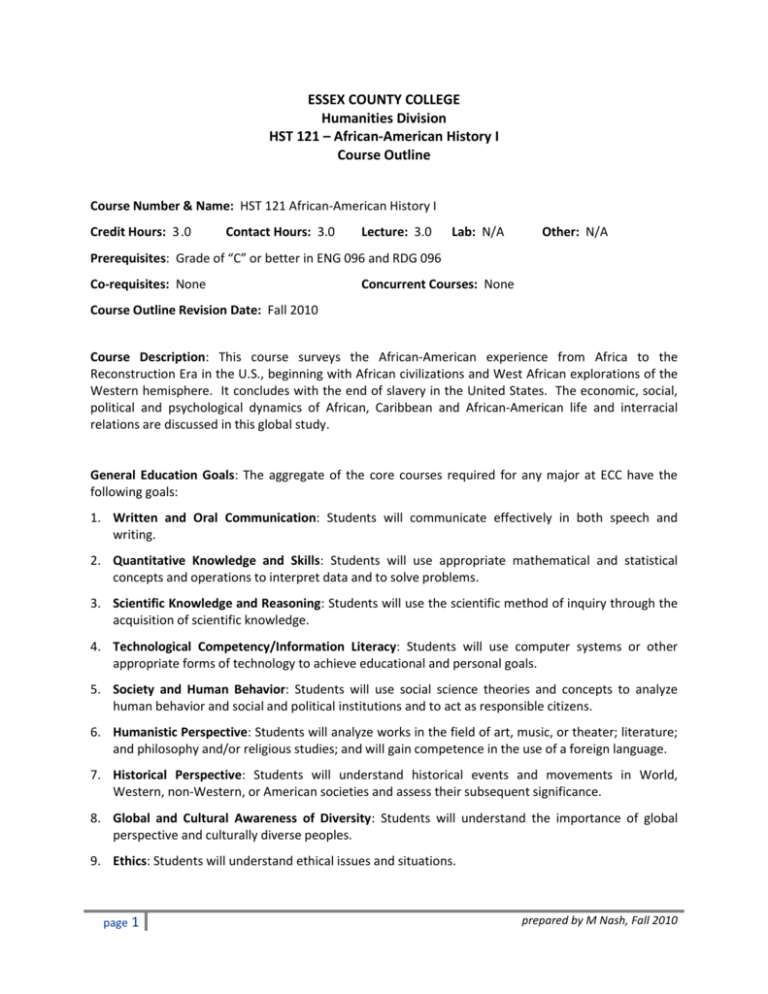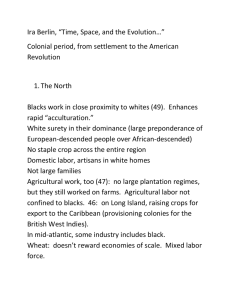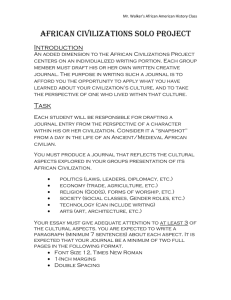
ESSEX COUNTY COLLEGE
Humanities Division
HST 121 – African-American History I
Course Outline
Course Number & Name: HST 121 African-American History I
Credit Hours: 3 .0
Contact Hours: 3.0
Lecture: 3.0
Lab: N/A
Other: N/A
Prerequisites: Grade of “C” or better in ENG 096 and RDG 096
Co-requisites: None
Concurrent Courses: None
Course Outline Revision Date: Fall 2010
Course Description: This course surveys the African-American experience from Africa to the
Reconstruction Era in the U.S., beginning with African civilizations and West African explorations of the
Western hemisphere. It concludes with the end of slavery in the United States. The economic, social,
political and psychological dynamics of African, Caribbean and African-American life and interracial
relations are discussed in this global study.
General Education Goals: The aggregate of the core courses required for any major at ECC have the
following goals:
1. Written and Oral Communication: Students will communicate effectively in both speech and
writing.
2. Quantitative Knowledge and Skills: Students will use appropriate mathematical and statistical
concepts and operations to interpret data and to solve problems.
3. Scientific Knowledge and Reasoning: Students will use the scientific method of inquiry through the
acquisition of scientific knowledge.
4. Technological Competency/Information Literacy: Students will use computer systems or other
appropriate forms of technology to achieve educational and personal goals.
5. Society and Human Behavior: Students will use social science theories and concepts to analyze
human behavior and social and political institutions and to act as responsible citizens.
6. Humanistic Perspective: Students will analyze works in the field of art, music, or theater; literature;
and philosophy and/or religious studies; and will gain competence in the use of a foreign language.
7. Historical Perspective: Students will understand historical events and movements in World,
Western, non-Western, or American societies and assess their subsequent significance.
8. Global and Cultural Awareness of Diversity: Students will understand the importance of global
perspective and culturally diverse peoples.
9. Ethics: Students will understand ethical issues and situations.
page 1
prepared by M Nash, Fall 2010
Course Goals: Upon successful completion of this course, students should be able to do the following:
1. identify the African origin of the African-American community and discuss the characteristics of the
civilizations they built in Africa; (GEG 7)
2. assess the importance of the pre-Columbian African presence in the West and the influence of
Africans on Meso-American and Caribbean cultures; (GEG 7, GEG 8)
3. describe and critically examine the events that lead to and characterized the Atlantic Slave Trade
and its role in the shaping of an African-American culture; (GEG 7)
4. describe the contributions and struggles of African-American people in American and Caribbean
society; (GEG 5, GEG 7, GEG 8) and
5. critically examine, in a comparative sense, the struggles of enslaved and free blacks in the U.S.
and/or other parts of the African Diaspora. (GEG 5, GEG 7, GEG 8, GEG 9)
Measurable Course Performance Objectives (MPOs): Upon successful completion of this course,
students should specifically be able to do the following:
1. Identify the African origin of the African-American community and discuss the characteristics of the
civilizations they built in Africa:
1.1 identify and describe such classical and medieval civilizations as Kemet (ancient Egypt), Nubia,
Ghana, Mali, Songhay, Kanem Borno, and others;
1.2 recognize and discuss the social, political, and economic structures of such civilizations as Kemet
(ancient Egypt), Nubia, Ghana, Mali, Songhay, Kanem Borno, and others; and
1.3 identify and summarize some of the major works of scholars who have written about ancient
African civilizations and whose writings have influenced the field of African and African-American
History
2. Assess the importance of the pre-Columbian African presence in the West and the influence of
Africans on Meso-American and Caribbean cultures:
2.1 identify and summarize evidence given by scholars, such as Ivan van Sertima, that proves there
was an African presence in America before Columbus;
2.2 recognize and explain the various ways in which African culture became manifest in the Americas
and in other parts of the Western world;
2.3 assess the level of complexity and sophistication of African civilizations that sponsored preColumbian expeditions to the Western world;
2.4 recognize and discuss the cultural and religious backgrounds of pre-Columbian Africans in
America and how they compared and contrasted to the Native American and European cultures
they encountered; and
2.5 record journal entries explaining the objective and main point of the lectures/discussions, and
how they were received emotionally and intellectually by the student
page 2
prepared by M Nash, Fall 2010
Measurable Course Performance Objectives (MPOs) (continued):
3. Describe and critically examine the events that lead to and characterized the Atlantic Slave Trade
and its role in the shaping of an African-American culture:
3.1 identify and evaluate the importance of the beginning of West African relations with European
explorers and traders;
3.2 identify and discuss the specific characteristics of the Middle Passage and the role it played in the
process of transforming African cultures to distinct African-American cultures;
3.3 recognize and describe the role that power, economics, and racism played in the characterization
of the Atlantic Slave Trade; and
3.4 identify and explain the reasons why the Atlantic Slave Trade is often referred to as the
Triangular Trade
4. Describe the contributions and struggles of African-American people in American and Caribbean
society:
4.1 identify and describe the role of African Americans in the struggle for Civil Rights;
4.2 identify and describe the role of African Americans in the Black Nationalist Movement;
4.3 identify and describe African Americans in the Arts Movement;
4.4 identify and describe African Americans in government roles;
4.5 identify and describe African Americans in education;
4.6 identify and describe African Americans in the military;
4.7 identify and describe African American inventors and those in science;
4.8 identify and describe African Americans in sports;
4.9 identify and describe African Americans in entrepreneurship; and
4.10 identify and describe struggles unique to African-American women
5. Critically examine, in a comparative sense, the struggles of enslaved and free blacks in the U.S.
and/or other parts of the African Diaspora:
5.1 recognize and describe the backgrounds and historical challenges of the descendants of African
slaves in the U.S., such as but not limited to the Afro-Caribbean, Afro-Latin, Afro-Europeans,
Afro-Asian, Afro-Canadians, and the African-born; and
5.2 recognize and describe the backgrounds and historical challenges of the Black religious
communities, such as Christian, Muslim, Jewish, Yoruba and other established religious
expressions within Black America
Methods of Instruction: Instruction will consist of a combination of lectures, class discussions, individual
work, group work, and a research paper.
Outcomes Assessment: Test and exam questions are blueprinted to course objectives. A checklist rubric
is used to evaluate the research paper for the presence of course objectives. Data is collected and
analyzed to determine the level of student performance on these assessment instruments in regards to
meeting objectives. The results of this data analysis are used to guide necessary pedagogical and/or
curricular revisions.
page 3
prepared by M Nash, Fall 2010
Course Requirements: All students are required to:
1. Take a minimum of two objective and essay exams (a midterm exam and a final exam).
2. Complete a research proposal consisting of a summary, a research question, an outline and sources
to be used, within the first six weeks of the semester. This research proposal will be used to guide
the completion of one documented research paper using the Chicago Manual of Style or MLA
parenthetical form of citation.
3. Prepare and execute the delivery of an oral presentation in front of peers and the instructor on the
research conducted.
4. Complete the reading of all assigned material and demonstrate having done so by taking part in
class discussions.
Methods of Evaluation: Final course grades will be computed as follows:
Grading Components
Class Participation/Quizzes/Assignments
% of
final course grade
5 – 15%
Class participation, quizzes and assignments will show evidence
of the student’s active engagement in the course, and serve as a
means to measure the extent to which students recognize the
importance of Africa as the background to the history of African
Americans and have mastered other course objectives.
Research Paper
15 – 20%
The research paper will show evidence of the extent to which
students meet course objectives, and will involve formulating a
research proposal consisting of a research question, summary,
outline, and bibliography. In addition, students will utilize
primary and secondary research sources in order to develop
and support their history thesis, while clearly maintaining their
own voice in the dialogue.
Midterm Exam
20 – 25%
The midterm exam will show evidence of the extent to which
students have mastered course objectives relating to the
material covered in the first seven weeks of class.
Oral/Multimedia Presentation
5 – 15%
The oral/multimedia presentation will show evidence of the
mastery of course objectives, as well as the student’s ability to
publicly affirm, effectively convey ideas related to research
conducted, and defend a history thesis.
Final Exam
25 – 30%
The final exam will show evidence that the students have
mastered and synthesized material covered in the entire course
with more emphasis on material covered in the final eight
weeks.
NOTE: The instructor will provide specific weights for each of the grading components at the beginning of
the semester. Students must average 70% or above to obtain a grade of “C” or higher in the course.
page 4
prepared by M Nash, Fall 2010
Academic Integrity: Dishonesty disrupts the search for truth that is inherent in the learning process and
so devalues the purpose and the mission of the College. Academic dishonesty includes, but is not
limited to, the following:
plagiarism – the failure to acknowledge another writer’s words or ideas or to give proper credit
to sources of information;
cheating – knowingly obtaining or giving unauthorized information on any test/exam or any
other academic assignment;
interference – any interruption of the academic process that prevents others from the proper
engagement in learning or teaching; and
fraud – any act or instance of willful deceit or trickery.
Violations of academic integrity will be dealt with by imposing appropriate sanctions. Sanctions for acts
of academic dishonesty could include the resubmission of an assignment, failure of the test/exam,
failure in the course, probation, suspension from the College, and even expulsion from the College.
Student Code of Conduct: All students are expected to conduct themselves as responsible and
considerate adults who respect the rights of others. Disruptive behavior will not be tolerated. All
students are also expected to attend and be on time all class meetings. No cell phones or similar
electronic devices are permitted in class. Please refer to the Essex County College student handbook,
Lifeline, for more specific information about the College’s Code of Conduct and attendance
requirements.
page 5
prepared by M Nash, Fall 2010
Course Content Outline: based on the text The African-American Odyssey, 2nd edition, by Darlene Hine,
William Hine and Stanley Harrold; published by Pearson/Prentice Hall; ISBN #: 0-205-71341-6.
Week
Topics Covered
1
Course Introduction/Review of Class Syllabus
2
Africa and African Exploration of the New World
3
Information Literacy Workshop
4
The Middle Passage
QUIZ #1
5
Black People in Colonial North America
6
African Americans and the Struggle for Independence
7
African Americans in the New Nation
MIDTERM EXAM
8
Life in the Cotton Kingdom
9
Research Proposals due
10
Free Black People in Antebellum America
11
Opposition to Slavery
12
Oral/Multimedia Presentations begin
13
Slavery and the Civil War
14
Liberation: African Americans and the Civil War
Research Paper due
15
page 6
FINAL EXAM
prepared by M Nash, Fall 2010






